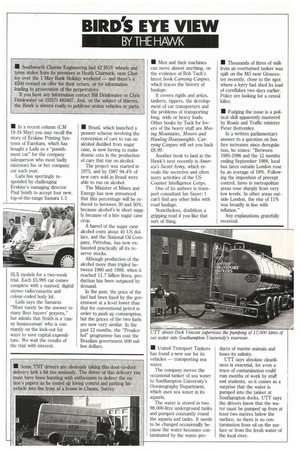• In a recent column (CM 18-24 May) you may
Page 65

If you've noticed an error in this article please click here to report it so we can fix it.
recall the story of Erskine Printing Systems of Fareham, which has bought a Lada as a "punishment car" for the company salesperson who most badly mistreats his or her company car each year.
Lada has sportingly responded by challenging Erskine's managing director Paul Smith to accept four new, top-of-the-range Samara 1.5 SLX models for a two-week trial. Each 25,995 car comes complete with a sunroof, digital stereo radio/cassette and colour-coded body kit.
Lada says the Samaras "Must surely be the answer to many fleet buyers' prayers," but admits that Smith is a 'canny businessman' who is constantly on the look-out for ways to save capital expenditure. We wait the results of the trial with interest. • Brazil, which launched a pioneer scheme involving the conversion of cars to run on alcohol distilled from sugar cane, is now having to make drastic cuts in the production of cars that run on alcohol.
The project was started in 1975, and by 1987 94.4% of new cars sold in Brazil were able to run on alcohol.
The Minister of Mines and Energy has now announced that this percentage will be reduced to between 30 and 50%, because alcohol's in short supply because of a late sugar cane crop.
A barrel of the sugar cane alcohol costs about 40 US dollars, and the National Oil Company, Petrobas, has now exhausted practically all its reserve stocks.
Although production of the alcohol more than tripled between 1980 and 1988, when it reached 11.7 billion litres, production has been outpaced by demand.
In the past, the price of the fuel had been fixed by the government at a level lower than that for conventional petrol in order to push up consumption, but the prices of the two fuels are now very similar. In the past 12 months, the "Proalcohol" programme has cost the Brazilian government 600 million dollars. • Men and their machines can move almost anything, on the evidence of Bob Tuck's latest book Carrying Cargoes, which traces the history of haulage.
It covers rigids and artics, tankers, tippers, the development of car transporters and the problems of transporting long, wide or heavy loads. Other books by Tuck for lovers of the heavy stuff are Moving Mountains, Movers and Hauling Heavyweights. Carrying Cargoes will set you back E8.99.
Another book to land in the Hawk's nest recently is America's Secret Army, which reveals the secretive and often nasty activities of the US Counter Intelligence Corps.
One of its authors is transport consultant Ian Sayer: I can't find any other links with road haulage.
Nonetheless, doubtless a gripping read if you like that sort of thing.
• United Transport Tankers has found a new use for its vehicles — transporting sea water.
The company moves the occasional tanker of sea water to Southampton University's Oceanography Department, which uses sea water in its aquaria.
The water is stored in two 98,000-litre underground tanks and pumped constantly round the aquaria and tanks. It needs to be changed occasionally because the water becomes contaminated by the waste pro • Thousands of litres of milk from an overturned tanker was spilt on the M5 near Gloucester recently, close to the spot where a lorry had shed its load of cornflakes two days earlier. Police are looking for a cereal killer.
• Fudging the issue is a political skill apparently mastered by Roads and Traffic minister Peter Bottomley.
In a written parliamentary answer to a question on bus fare increases since deregulation, he states: "Between 1985-1986 and the 12 months ending September 1988, local bus fares outside London rose by an average of 19%. Following the imposition of precept control, fares in metropolitan areas rose sharply from very low levels. In other areas outside London, the rise of 11% was broadly in line with inflation."
Any explanations gratefully received.
ducts of marine animals and loses its salinity.
UT'!' says absolute cleanliness is essential, for even a trace of contamination could ruin months of work by staff and students, so it comes as a surprise that the water is pumped into the tanker at Southampton docks. UTT says the drivers know that the water must be pumped up from at least two metres below the surface, so there is no contamination from oil on the surface or from the fresh water of the local river.




























































































































































































